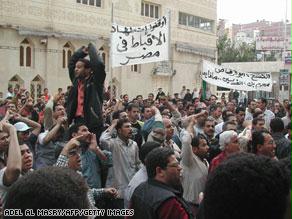 53 incidents in 17 governorates: 14 cases of collective retribution; 17 clashes escalate to sectarian violence; 7 attacks on churches
53 incidents in 17 governorates: 14 cases of collective retribution; 17 clashes escalate to sectarian violence; 7 attacks on churches
On 11 April, the Egyptian Initiative for Personal Rights (EIPR) issued an analytical study titled “Two Years of Sectarian Violence: What Happened? Where Do We Begin?” The study details the expanding geographic scope and increasing frequency of incidents of sectarian violence over the last two years, as well as the state’s failure to deal with the problem. Viewing these incidents as isolated occurrences, the state lacks a comprehensive understanding of its causes, manifestations or possible solutions. The study draws on cases of sectarian violence that occurred from January 2008 to January 2010, in which 53 incidents were documented in 17 governorates. The violence left some dead, many wounded and dozens of homes, shops and other property destroyed and looted.
Drafted by Adel Ramadan, the EIPR’s legal officer, the study identifies four major types of sectarian violence: collective retribution against Christians, murder on the basis of religious identity, the targeting of churches and cases in which Christians were prohibited from engaging in their religious rites. The report also examines how the state addresses sectarian violence: viewing such incidents purely as an issue of security, it seeks only to impose order and calm on the affected area. It also often times uses administrative detention to pressure the parties to engage in customary reconciliation as an alternative to the justice system.
The study notes that crimes committed in the framework of sectarian violence are very rarely prosecuted due to the failure or refusal of the Public Prosecutor to refer those involved in the violence to court. As such, criminal impunity is the norm in most cases of sectarian violence. The governorate of Minya has seen the most cases of sectarian violence over the last two years — approximately one incident every 35 days in the period under review — and none of these cases, despite their number, were referred to court.
The EIPR has released this study to raise the alarm to both the state and society, so that no official or institution can claim not to have known about the pressing danger that sectarian tension represents to Egypt. The study also puts forward several recommendations to the government. Among others, it urges the government to stop the security establishment’s violations of the Constitution and the law, which only serve to foster or escalate sectarian tension. The study also calls on the government to open an immediate investigation into every case of sectarian violence, hold those responsible to account and fairly compensate the victims. The study recommends that the People’s Assembly hold public hearings on the issue with the participation of victims and civil society representatives to air the facts and take measures necessary to end all forms of direct and indirect discrimination against Christians in Egypt.



